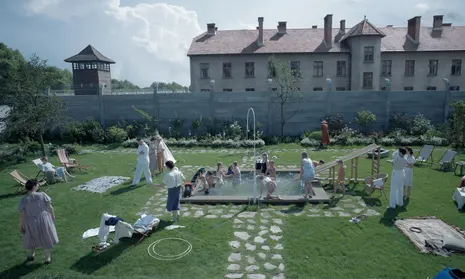
Four movies into his very slowly expanding movie CV (Sexy Beast, Birth and Under The Skin) Jonathan Glazer once again lands a punch that no-one could see coming. I mean, how could they?
It’s been ten years since the sublime and shocking Under The Skin (from a source novel by one of my favourite authors, Michel Faber) now he’s done it again with a novelistic source from Martin Amis. Having read a little about this it would seem that the movie and the book are barely related. Same theme and location, yes, but story-wise very different.
For a start it would be a push to say the movie’s narrative led. There is a slight thread holding it together but this is really an exercise in stylistic horror like you’ve never seen before.
The psychology of the holocaust has long fascinated me. How could an entire country apparently sign up to a dictator’s whims when his charisma, to me, seems so indecipherable. But worse, how could so many of his followers carry out such atrocities seemingly without question?
But this movie goes a step further still. How could the families of these monsters knowingly reap the benefits of this accursed man’s activities?
Sandra Hüller (who might win best actress at the Oscars for the incredible Anatomy of a Fall) stars as that very woman (Hedwig Höss). Living a life of privilege in an unattractive house with a cultivated, but not exactly stunning, garden in the lee of Auschwitz. Her husband, the camp Kommandant, played by Christian Friedel, is a snidely little creep who sleeps in a separate bed (his work done having sired five children to his despicable wife). At night he takes his pleasure with the Jewish housemaid, who’s always one dropped crumb away from the gas chambers that brood ominously just across the garden wall. Höss’s more than happy to remind her of that.
Höss takes her pick of fur coats, new blouses, diamonds concealed in toothpaste tubes as the apparent spoils of genocide filter regularly into their home. They party, they feed sumptuously, they swim in the river, they cough up the ashes of dead Jews – only a small blot on an idyllic lifestyle
Höss’s mother arrives, but soon leaves in disgust at this heinous way of living.
A young girl sneaks out at night to hide apples for the Jewish labourers – a death defying act that is momentously captured on night vision film. This stunning technique turns her into a lurid white spectre against what looks like a nuclear background, to the sound of an outrageous soundtrack by Mica Levy. Underscoring the score the Kommandant reads Hansel & Gretel to his younger children (it’s no coincidence that the evil witch is burned in the oven – although the story “cooks” her to soften the blow). Who this mysterious figure is is not revealed, but perhaps it’s the Kommandant’s oldest daughter. The one with a conscience. The only one. The Kindly one.
It’s truly remarkable moviemaking.
The star of this colossal piece of work though is Johnny Burn, the sound designer, who brings Auschwitz to life without ever really seeing it. other than its rooftops.
On a side note. I’ve been to Auschwitz (which is actually three death camps not one) and the one that features in the movie, Auschwitz III is now a museum. These days it’s impeccably manicured and the buildings are entirely surprising, two or three story high red brick constructions that could be schoolhouses if we didn’t know better. It’s very disarming. The muddy, filthy wooden huts we all remember from the movies and the newsreels are in Auschwitz I, a short drive away. So this clean, Teutonic death factory is disarming and Glazer captures that strange orderliness of the setting as we often see the well-kept rooflines of the houses beyond. (Albeit with smoking chimneys and glowing fires)
What Burn does though is pull the rug away. The air of semi-respectability that we are seeing is subsumed by endless industrial groans suggesting boilers (certainly machinery we don’t want to think about too much) working at full blast. Gunshots echo out, but subtly in the distance, muffled shrieks, distant dogs barking, at one point a cold blooded murder. The steam train arriving with fresh cargo.
It all adds up to make Auschwitz a looming threat, playing out a murderous background soundscape, like a satanic orchestra, whilst in the foreground we see a sort of Utopia at play.
The movie is shot as a series of beautiful tableaux, often reminiscent of classical paintings, but interspersed with empty screens, red or black, and the mind-boggling night vision work. (it’s searingly black and white, not green, as you’ve come to expect). This creates a sense of tranquillity and opulence, and yet it’s backgrounded by the worst atrocities ever committed in Europe.
Jonathan Glazer has created his masterpiece. Few would imagine he could top his first three movies and yet this comes from a place that only he can truly understand. It’s not clear why he’s made this movie. It’s not actually telling us anything new and yet it feels like the most original take on a familiar tale we will ever come across.